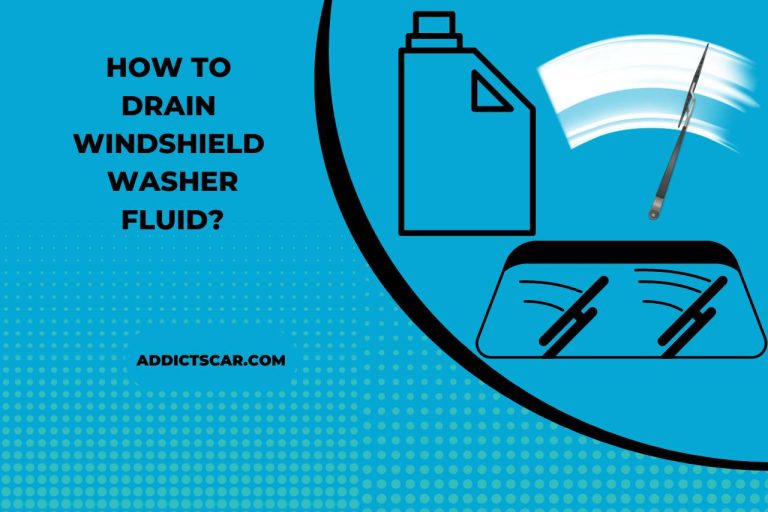Does Windshield Wiper Fluid Have Ammonia? Consumer Guide
“Does windshield wiper fluid have ammonia?” is a question many environmentally-conscious and health-aware car owners, such as you and us, frequently pose. As we are delving into the composition of popular wiper fluids, this article uncovers the truth about ammonia’s presence and explores its implications on both your vehicles and you.
From understanding the potential harm of ammonia-based cleaners to sifting through the best alternatives, we provide you with a comprehensive guide tailored for prioritizing safety and effectiveness. Navigate with us as we clear the haze around your pivotal automotive concern.
Does Windshield Wiper Fluid Have Ammonia?
Windshield wiper fluid does have ammonia. Generally, many commercial windshield wiper fluids contain ammonia because of its efficiency in cutting through grime and providing streak-free clarity. However, the concentration of ammonia in these fluids is usually minimal and combined with other agents to ensure it doesn’t damage your car’s paint or rubber seals.
But you might ask, why is ammonia so commonly found in cleaning products? Here are some reasons:
Effective Cleaning
Ammonia excels at breaking down tough stains and stubborn residues, which makes it an attractive ingredient for windshield cleaning.
Streak-Free Finish
Ammonia evaporates quickly, leaving behind a clear, streak-free surface that ensures optimal visibility for you.
Cost-effective
It’s a readily available and affordable ingredient, making it a favored choice for many manufacturers, including us, aiming to produce effective products at a competitive price.
However, it’s crucial to note that not all windshield washer fluids have ammonia. Many brands offer “ammonia-free” products, catering to those of you who might have concerns about the chemical’s potential adverse effects on your vehicle’s surfaces or the environment. When choosing a fluid, always check the label or product details to know its contents.
Is It Bad To See Windshield Wiper Fluid Products With Ammonia?
Using windshield wiper fluid products with ammonia can be a double-edged sword. While ammonia is highly effective at cutting through grease and leaving a streak-free finish, there are potential drawbacks that you need to think about.
Ammonia can deteriorate the rubber components of your wipers over time, reducing their lifespan. Additionally, if the fluid comes into contact with your vehicle’s paint and isn’t promptly cleaned, it can cause discoloration or damage.
Furthermore, the fumes released by ammonia-based products can be harmful when you inhale in significant amounts. Thus, while these products clean efficiently, they require cautious use to avoid potential pitfalls.

Why Not to Use Ammonia-Based Cleaners for Windshield?
The reason why not to use ammonia-based cleaners for windshields is mentioned below. While ammonia is renowned for its powerful cleaning properties, several reasons highlight why it might not be the best choice for your vehicle’s windshield:
Rubber Degradation
One of the primary concerns with ammonia is its potential to degrade the rubber components of your windshield wipers. Continuous exposure can cause the rubber to dry out, crack, or become brittle over time, leading to inefficient wiper performance and a reduced lifespan.
Paint Damage
If an ammonia-based cleaner drips onto your car’s body and isn’t immediately removed, it can lead to paint discoloration or even strip the paint in some cases.
Health Concerns
Ammonia fumes can be potent. If you use it in an enclosed space, such as a garage, there’s a risk of you inhaling these fumes. Continuous inhalation can lead to respiratory issues and irritate the eyes, nose, and throat.
Streaking
While ammonia can provide a streak-free shine on the glass inside homes, it sometimes leaves streaks on your car windshields, especially if not properly diluted or wiped off.
Environmental Concerns
Ammonia is not always eco-friendly. When you use it in large quantities and do not dispose of it correctly, it can pose environmental hazards.
Considering these potential issues, we decided to opt for ammonia-free cleaning solutions to ensure both our car’s safety and our own well-being.
What Liquid Is Best for Windshield Wiper Fluid?
The best liquid for windshield wiper fluid should provide effective cleaning, be safe for your vehicle, and not pose any threats to your environment or you. Given these criteria, a commercial windshield wiper fluid specifically designed for automotive use typically stands out.
Formulated for Automotive Use
Commercial windshield wiper fluids are designed with vehicles in mind. They efficiently remove bugs, road grime, bird droppings, and other common contaminants that most drivers encounter.
Freezing Point
Many windshield washer fluids have a lower freezing point, ensuring they remain liquid even in colder temperatures, providing consistent cleaning action, and preventing potential damage to the wiper system.
Streak-free Cleaning
These fluids are formulated to evaporate quickly, leaving no residue behind, ensuring clear and streak-free visibility.
Additives for Extra Protection
Some premium wiper fluids have added benefits like water repellency, which causes rain to bead up and roll off, improving your visibility during wet conditions.
Safety and Environment
Quality wiper fluids are typically biodegradable and free from harmful toxins, ensuring they’re safe for your environment and you.
While some drivers from our readers have considered homemade solutions using distilled water, a few drops of dish soap, and sometimes even vinegar, it’s essential to ensure any DIY mix doesn’t damage your car’s paint or rubber components. However, a dedicated automotive windshield wiper fluid remains our top recommendation.
Continue Exploring: More Articles to Keep You Engaged


![The Clutch Pedal Stuck to the Floor? [Reasons]](https://www.addictscar.com/wp-content/uploads/2022/11/clutch-pedal-stuck-to-the-floor-768x512.jpg)




